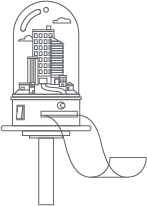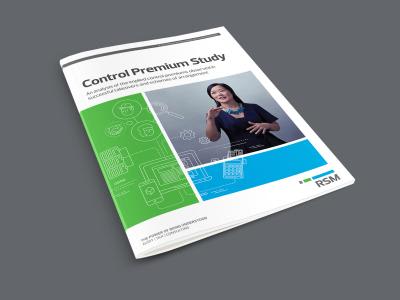RSM Australia (RSM), one of Australia’s largest mid-tier accounting firms, has revealed the findings of its latest control premium study, undertaken in partnership with Curtin University.
RSM Australia explores factors that can have an impact on the premium paid to acquire control.
The study revealed that, during the COVID-19 pandemic, average control premiums in Australia nearly doubled, growing from 32% in the 2019 calendar year to 61% in the 2020 calendar year.
This is a significant divergence from the long-term Australian average over the 15.5-year period of 34.7%.
A control premium is the amount that a buyer is willing to pay over and above the traded share price to gain a controlling ownership interest in a publicly-traded company.
The RSM 2021 Control Premium Study analyses successful takeovers and schemes of arrangement from 1 July 2005 through to 31 December 2020.
This period saw 605 successful control transactions for companies traded on the Australian Securities Exchange (ASX) and 131 transactions for companies on the New Zealand Securities Exchange (NZSX).
“Control premiums have risen sharply, especially in April and May 2020, when economic uncertainty was as its peak and acquirers took advantage of the distressed capital markets. With interest rates remaining low and companies holding significant cash reserves following a capital raising spree during COVID-19, merger and acquisitions (M&A) activity is expected to be high in Australia and New Zealand through FY2022 and beyond. It is critical for directors and investors to carefully consider the control premium component when assessing equity values for potential transactions.” Nadine Marke, Partner, RSM Australia.
The study is the fourth in the series, and the results show that control premiums are influenced by numerous factors including industry sector, consideration and transaction type, timing within the economic cycle, toehold (the extent of the buyer’s existing investment in the target), and size and market capitalisation of the company.
The new study spans 15.5 financial years, during which time Australia experienced a mining boom, the global financial crisis (GFC), and the post-mining boom ‘hangover’ followed by a gradual expansion until the COVID-19 pandemic.
The average control premium trended below the long-term average from FY2013 to FY2017, during a period of generally reduced transaction activity.
Significant Increases
However, in recent years, the analysis shows a significant increase in control premiums from an average of 27.6% in FY2019 to 50.7% in FY2020 and by calendar year (CY) from 32.4% in CY2019 to 61.1% in CY2020 reflecting the impact of COVID-19 on the Australian capital markets and equity valuations.
Metals and mining organisations saw the highest number of transactions over the study period while healthcare and telecommunications, IT, and software companies saw the highest pre-bid control premiums at 48.6% and 44.1% respectively.
Cyclical or volatile sectors (metals and mining, energy and technology) combine to represent 48.4% of overall transactions, which may result in control premiums in the Australian market having greater variability over time.
There has also been increasing use of schemes over the 15.5 year period with only 41.2% of transactions being schemes in the period FY2006 to FY2014 and 62.3% of transactions being schemes in the period FY2015 to FY2020.
The average control premium in the New Zealand market is significantly lower at 18.6% over the 15.5 year period, which the analysis indicates could be attributed to the uncontested nature of many takeovers in New Zealand. Lock-up agreements are used to reduce uncertainty and minimise the risk of a competing bid, which may allow lower premiums to be offered by a bidder.
The report revealed factors relating to the target, or the transaction itself, which may influence the control premiums observed in Australia.
These include:
- Industry sector: Sectors that are traditionally priced and valued on upside potential revealed considerably higher premiums (for example, healthcare and telecommunications, IT, and software) than those where valuations are more typically limited to asset base (for example, real estate and financial institutions).
- Consideration: Scrip deals, which offer ‘relative’ consideration, continue to attract lower premiums than cash-only deals, where consideration is absolute. The average control premium at 20 days pre-bid cash transactions was 36.2%, considerably higher than scrip and scrip/cash transactions, where the observed premiums were 32.3% and 28.1% respectively.
- Schemes of arrangement: Representing almost half of the transactions in the data set, schemes of arrangement attract lower average control premiums at 32.1% than off-market transactions at 37.3%.
- Size: There appears to be a strong negative correlation between market capitalisation and the level of control premium paid. Analysis shows the control premium declines as target capitalisation increases and the control premium is appreciably higher in transactions involving targets with a market capitalisation of less than $50m.
- Toehold: Existing knowledge of a target (as a consequence of a toehold) can lead acquirers to pay significantly higher premiums than are otherwise observed, with the highest premiums paid when the toehold is between 10% and 20%.
“The economic cycle creates the fear or optimism that fuels risk appetite and helps drive share prices. RSM believes the control premium is influenced by these factors to varying degrees, at different times, within the economic cycle. This can be seen in the period since COVID-19 was declared a global pandemic, which led to significant falls in global equity markets and a rise in observed control premiums driven by opportunistic or strategic acquisitions.” Nadine Marke, Partner, RSM Australia.
RSM calculated the implied control premium as (offer price – share price) / share price, based on the closing share price of the target company at 20, five and two days before and following the announcement of the offer. The analysis primarily focuses on 20-day pre-bid premiums, as it was considered less likely to be influenced by bid speculation and as providing the most reliable observation of any control premium implicit in the transaction.
About RSM Australia
RSM Australia is an independent member firm of RSM, the sixth-largest professional services accounting and consulting organisation in the world. RSM Australia is a full-service national accounting and advisory firm delivering expert corporate financial and advisory accounting services to clients across diverse industry sectors. Its one-firm structure means clients can more readily connect to its extensive national and international networks, expertise and industry experience. RSM has 33 offices across Australia, combined with over 95 years’ experience. Its network spans 116 countries and comprises 750 offices.
CONTACT US
If you have any questions or would like to chat to an adviser, please contact your nearest RSM office.


